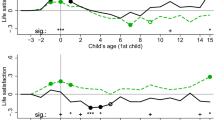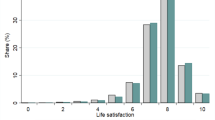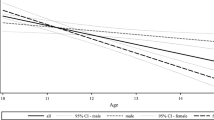Abstract
This study investigates the effect of having children on parents’ life satisfaction and happiness in Europe. We utilize four waves of the European Values Survey (EVS) from 1981 to 2008. To identify causality, we use instrumental variables estimation. We exploit time and country level variation in five family policies as instruments for having children. For parents who have had children due to the generosity of family policies, having children increases parent’s life satisfaction by 0.33–0.41 points on a 10 point scale. This effect is significantly more pronounced when parents are over the age of 50. Yet, children’s effects on life satisfaction and happiness is negative for single and full-time working parents. The positive effect of having children on life satisfaction and happiness has substantially eroded over the EVS waves which explains the reductions in the fertility rate in Europe.


Similar content being viewed by others
Notes
The results are robust to different age thresholds such as parents older than 55, 60 and 65 years old.
The results are robust to different age thresholds such as parents younger than 23, 22, 21 and 20 years old.
43% (full time) + 7% (part-time) + 6% (self-employed) + 21% (retired) + 5% (unemployed).
References
Aassve, A., Goisis, A., & Sironi, M. (2012). Happiness and childbearing across Europe. Social Indicators Research,108(1), 65–86.
Angrist, J. D., & Imbens, G. W. (1994). Identification and estimation of local average treatment effects. Econometrica,62(2), 467–475.
Becker, G. S. (1960). An economic analysis of fertility. In Demographic and economic change in developed countries (pp. 209–240). New York: Columbia University Press.
Becker, G. S. (1981). A treatise on the family. Cambridge, MA: Harvard University Press.
Blanchflower, D. G., & Oswald, A. J. (2004). Well-being over time in Britain and the USA. Journal of Public Economics,88(7–8), 1359–1386.
Bound, J., Jaeger, D., & Baker, R. (1995). Problems with instrumental variables estimation when the correlation between the instruments and the endogenous explanatory variables is weak. Journal of the American Statistical Association,90, 443–450.
Brickman, P., Coates, D., & Janoff-Bulman, R. (1978). Lottery winners and accident victims: Is happiness relative? Journal of Personality and Social Psychology,36, 917–927.
Bures, R. M., Koropeckyj-Cox, T., & Loree, M. (2009). Childlessness, parenthood, and depressive symptoms among middle-aged and older adults. Journal of Family Issues,30(5), 670–687.
Campell, A., Converse, P. E., & Rodgers, W. L. (1976). The quality of American life: Perceptions, evaluations, and satisfactions. New York: Russell Sage Foundation.
Cetre, S., Clark, A. E., & Senik, C. (2016). Happy people have children: Choice and self-selection into parenthood. European Journal of Population/Revue européenne de Démographie,32, 445–473.
Cigno, A. (1991). Economics of the family. Oxford: Clarendon Press.
Clark, A. E., Diener, E., Georgellis, Y., & Lucas, R. E. (2008). Lags and leads in life satisfaction: A test of the baseline hypothesis. The Economic Journal,118, 222–243.
Clark, A. E., & Oswald, A. J. (2002). Well-being in panels. Unpublished working paper. University of Warwick, UK.
Cowan, C. P., Cowan, P. A., Heming, G., Garrett, E., Coysh, W. S., Curtis-Boles, H., et al. (1985). Transitions to parenthood: His, hers, and theirs. Journal of Family Issues,6, 451–481.
Delpiano, J., & Simonsen, M. (2012). The toll of fertility on mother’s wellbeing. Journal of Health Economics,31, 752–766.
Dex, S., & Joshi, H. (1999). Careers and motherhood: policies for compatibility. Cambridge Journal of Economics,23, 641–659.
Diener, E. (1984). Subjective well-being. Psychological Bulletin,95(3), 542–575.
Diener, E., & Fujita, F. (1995). Resources, personal strivings, and subjective well-being: A nomothetic and idiographic approach. Journal of Personality and Social Psychology,68(5), 926–935.
Easterlin, R. (2005). Building a better theory of well-being. In L. Bruni & P. Porta (Eds.), Economics and happiness. Reality and paradoxes. Oxford: Oxford University Press.
Evenson, R., & Simon, R. (2005). Clarifying the relationship between parenthood and depression. Journal of Health and Social Behavior,46(4), 341–358.
Ferrer-i-Carbonell, A., & Frijters, P. (2004). How important is methodology for the estimates of the determinants of happiness? The Economic Journal,114(497), 641–659.
Friedman, D., Hechter, M., & Kanazawa, S. (1994). A theory of the value of children. Demography,31(3), 375–401.
Gauthier, A. H. (2000). Public policies affecting fertility and families in Europe: A survey of the 15 member states. Seville: European Observatory on Family Matters.
Gauthier, A. (2007). The impact of family policies on fertility in industrialized countries: A review of the literature. Population Research and Policy Review,26(3), 323–346.
Gauthier, A. H., & Hatzuis, J. (1997). Family benefits and fertility: An econometric analysis. Population Studies,51, 295–306.
Gilbert, D. T., Driver-Linn, E., & Wilson, T. D. (2002). The trouble with Vronsky: Impact bias in the forecasting of future affective state. In L. F. Barrett & P. Salovey (Eds.), The wisdom in feeling: Psychological processes in emotional intelligence (pp. 114–143). New York: Guilford.
Grossbard, S., & Mukhopadhyhay, S. (2013). Spousal love and children: An economic analysis. Review of Economics of the Household,11, 447–467.
Hakim, C. (2003). Work-lifestyle choices in the 21st century: Preference theory. Oxford: Oxford University Press.
Haller, M., & Hadler, M. (2006). How social relations and structures can produce happiness and unhappiness: An international comparative analysis. Social Indicators Research,75(2), 169–216.
Hansen, T. (2012). Parenthood and happiness: A review of folk theories versus empirical evidence. Social Indicators Research,108, 29–64.
Haybron, D. M. (2007). Life satisfaction, ethical reflection, and the science of happiness. Journal of Happiness Studies,8, 99–138.
Hilleras, P. K., Aguero-Torres, H., & Winblad, B. (2001). Factors influencing well-being in the elderly. Current Opinion in Psychiatry,14(4), 361–365.
Hoem, J. M. (1990). Social policy and recent fertility change in Sweden. Population and Development Review,16, 735–748.
Hoem, J. M. (1993). Public policy as the fuel of fertility: effects of a policy reform on the pace of childbearing in Sweden in the 1980s. Acta Sociologica,36, 19–31.
Hoffman, L. W., & Hoffman, M. L. (1973). The value of children to parents. In J. T. Fawcett (Ed.), Psychological perspectives on population (pp. 19–76). New York: Basic Books.
Kahneman, D., Krueger, A. B., Schkade, D. A., Schwarz, N., & Stone, A. A. (2004). A survey method for characterizing daily life experience: The day reconstruction method. Science,306(5702), 1776–1780.
Kohler, H. P., Behrman, J. R., & Skytthe, A. (2005). Partner plus children = happiness? The effects of partnerships and fertility on well-being. Population and Development Review,31(3), 407–445.
Kruk, K. E. (2014). The effect of children on mental health in old age. Social Science and Medicine,100, 1–11.
LaRossa, R., & LaRossa, M. M. (1981). Transition to parenthood: How infants change families. Beverly Hills, CA: Sage.
Le Moglie, M., Mencarini, L., & Rapallini, C. (2015). Is it just a matter of personality? On the role of subjective well-being in childbearing behavior. Journal of Economic Behavior & Organization,117, 453–475.
Loewenstein, G., O’Donoghue, T., & Rabin, M. (2003). Projection bias in predicting future utility. Quarterly Journal of Economics,118(4), 1209–1248.
Lucas, R. E., Diener, E., & Suh, E. (1996). Discriminant validity of well-being measures. Journal of Personality and Social Psychology,71(3), 616–628.
Margolis, R., & Myrskylä, M. (2011). A global perspective on happiness and fertility. Population and Development Review,37(1), 29–56.
McLanahan, S., & Adams, J. (1987). Parenthood and psychological well-being. Annual Review of Sociology,13, 237–257.
McQuillan, J., Torres Stone, R. A., & Greil, A. L. (2007). Infertility and life satisfaction among women. Journal of Family Issues,28(7), 955–981.
Mochon, D., Norton, M. I., & Ariely, D. (2008). Getting off the hedonic treadmill, one step at a time: The impact of regular religious practice and exercise on well-being. Journal of Economic Psychology,29, 632–642.
Myrskylä, M., & Margolis, R. (2014). Happiness: Before and after the kids. Demography,51, 843–1866.
Nomaguchi, K. M., & Milkie, M. A. (2003). Costs and rewards of children: The effects of becoming a parent on adults’ lives. Journal of Marriage and Family,65, 356–374.
Pinquart, M., & Sörensen, S. (2000). Influences of socioeconomic status, social network, and competence on subjective well-being in later life: A meta-analysis. Psychology and Aging,15(2), 187–224.
Rindfuss, R., David, G. S., Philip, M., Øystein, K., & Karen, B. G. (2007). Child care availability and first birth timing in Norway. Demograhy,44, 345–372.
Schimmack, U., Diener, E., & Oishi, S. (2002). Life-satisfaction is a momentary judgment and a stable personality characteristic: The use of chronically accessible and stable sources. Journal of Personality,70(3), 345–384.
Staiger, D., & Stock, J. H. (1997). Instrumental variables regression with weak instruments. Econometrica,65, 557–586.
Turchi, B. A. (1975). The demand for children: The economics of fertility in the United States. Cambridge, MA: Ballinger.
Twenge, J. M., Campbell, W. K., & Foster, C. A. (2003). Parenthood and marital satisfaction: A meta-analytic review. Journal of Marriage and Family,65, 574–583.
Wooldridge, J. (2002). Econometric analysis of cross section and panel data. Cambridge: The MIT Press.
Author information
Authors and Affiliations
Corresponding author
Additional information
Publisher's Note
Springer Nature remains neutral with regard to jurisdictional claims in published maps and institutional affiliations.
Rights and permissions
About this article
Cite this article
Ugur, Z.B. Does Having Children Bring Life Satisfaction in Europe?. J Happiness Stud 21, 1385–1406 (2020). https://doi.org/10.1007/s10902-019-00135-5
Published:
Issue Date:
DOI: https://doi.org/10.1007/s10902-019-00135-5




